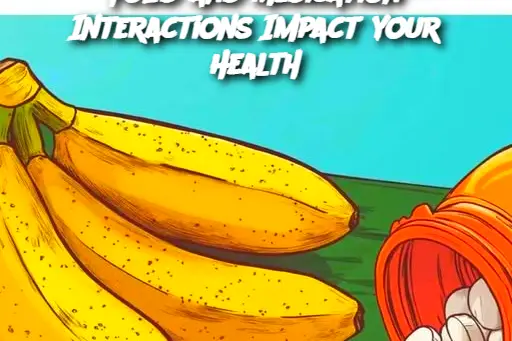Introduction: When it comes to managing health and well-being, the foods we eat play a more significant role than we may realize—especially when it comes to how they interact with medications. Many people are unaware of the potential for food and drug interactions, which can either reduce the effectiveness of treatment or lead to dangerous side effects. This article aims to shed light on the importance of understanding these interactions, providing essential information on how food choices can impact the success of medication regimens. By gaining awareness of this critical issue, you can ensure that your treatment is as effective as possible and avoid complications that could hinder your health progress.
Key Ingredients of Effective Health Management:
Medications: Prescription drugs, over-the-counter medications, and supplements are all important elements of managing various health conditions. Medications work by targeting specific areas of the body, but their effectiveness can sometimes be affected by what you eat.
Foods: Certain foods have compounds that can either enhance or interfere with the way medications work in the body. These foods may contain vitamins, minerals, or other nutrients that can cause beneficial or adverse effects when combined with specific drugs.
Nutritional Knowledge: Understanding the types of foods that are safe to consume with your medication is essential for maintaining a healthy balance. This knowledge helps prevent unwanted reactions that could compromise your treatment.
Common Food and Medication Interactions:
Grapefruit and Statins:
Grapefruit is known to interfere with the metabolism of certain medications, particularly statins (cholesterol-lowering drugs). The compounds in grapefruit can inhibit enzymes in the liver that break down these medications, leading to higher levels of the drug in the bloodstream and an increased risk of side effects, such as muscle pain or liver damage.
Leafy Greens and Blood Thinners:
Leafy greens, like spinach and kale, are rich in vitamin K, which plays a crucial role in blood clotting. For individuals taking blood thinners like warfarin, consuming large amounts of vitamin K-rich foods can interfere with the drug’s effectiveness, potentially causing dangerous clotting.
Dairy and Antibiotics:
Dairy products, such as milk and cheese, can bind to certain antibiotics (like tetracycline and ciprofloxacin), reducing their absorption in the digestive tract. This can make the antibiotics less effective, prolonging infection or allowing the bacteria to resist treatment.
Caffeine and Medications for Anxiety or Insomnia:
Caffeine, found in coffee, tea, and many sodas, can counteract the effects of medications designed to treat anxiety or insomnia. Medications like benzodiazepines and sleep aids may become less effective if combined with excessive caffeine, potentially causing insomnia or heightened anxiety.
Alcohol and Pain Relievers:
Alcohol can increase the sedative effects of pain relievers such as opioids and acetaminophen, leading to dangerous drowsiness, respiratory depression, or liver damage. Alcohol should generally be avoided when taking these medications.
Tips for Managing Food and Medication Interactions:
Consult Your Doctor or Pharmacist: Always check with your healthcare provider about any potential food and medication interactions. They can provide specific advice based on the medications you’re taking and your unique health needs.
the rest on next page
ADVERTISEMENT

